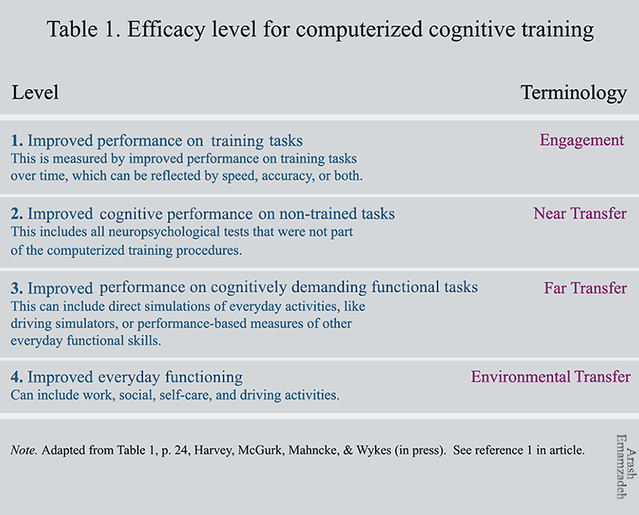Mild Cognitive Impairment
Evidence That Computerized Cognitive Training Works
The effectiveness of cognitive training is reviewed in a recent article.
Posted August 26, 2018

Many people use computerized cognitive training with the hopes of preventing mental decline or improving mental performance. But do these brain training games actually work?
A recent article by Harvey and colleagues, in press in Biological Psychiatry, evaluates the effects of cognitive training in schizophrenia and healthy aging, concluding that computerized cognitive training (CCT) does work.
Background of the controversy
Computerized brain training is a fast-growing multi-billion dollar industry. According to one estimate, while in 2005 the market had just over $200 million in sales, that number has been increasing almost exponentially, reaching $1.3 billion in 2013, and is projected to surpass $6 billion by 2020.2
And yet, despite its strong sales, the effectiveness of CCT is remains controversial. On October 20, 2014, the Stanford Center on Longevity and the Berlin Max Planck Institute for Human Development released a joint statement, signed by more than 70 psychologists, questioning the effectiveness of CCT, especially for preventing cognitive decline in older people:
“We object to the claim that brain games offer consumers a scientifically grounded avenue to reduce or reverse cognitive decline when there is no compelling scientific evidence to date that they do.”
Later, a group of more than 100 researchers and therapists responded to the above statement, expressing “significant reservations,” and asserting that a “substantial and growing body of evidence shows that certain cognitive training regimens can significantly improve cognitive function, including in ways that generalize to everyday life. This includes some exercises now available commercially.”
Since then, additional studies and reviews have been published but the controversy has not been resolved.
The present review
Harvey and colleagues claim that both the 2014 position statement and the 2016 review paper2 reached erroneous conclusions.
Why? One, because narrow definitions of CCT have excluded many studies, such as ones on cognitive remediation―interventions that target cognitive deficits and aim to improve daily functioning.1
Some of the investigations concerning cognitive remediation had been excluded partly because they included both social support and mental training, thus making it difficult to determine if the positive outcome observed was caused by one, the other, or both factors.
Nevertheless, Harvey et al. believe that social support is often an important and necessary element of cognitive remediation, such as for people with schizophrenia. Thus, they broaden the definition of CCT, to include not only human-computer interaction but social support and guidance too.
A second reason for the erroneous conclusions of previous studies is related to conflicting expectations about what counts as cognitive improvement.
For example, the 2016 review had disregarded improvement on a cognitive task, if the task resembled the one on which the participants were trained. That is, improvement in a single cognitive domain was considered unimportant. Harvey and colleagues question this mindset, asking, “What if memory training made memory impairments in cortical dementia such as Alzheimer’s disease go away?”1
Using their now expanded definitions of cognitive training and effectiveness, the authors then review a number of trials and meta-analyses3 (on people with schizophrenia, and on older adults), and find consistent evidence that cognitive training is indeed effective, and that it also shows far transfer―transfer of learning from the computerized games to real world challenging functional tasks (see 3, in Table 1).

As you can see from the table, far transfer is the third level of efficacy, ahead of engagement (greater achievement on the training task), and near transfer (better performance on non-trained cognitive tasks), but behind environmental transfer (greater everyday functioning). Therefore, the fact that cognitive training appears to show far transfer indicates that it is fairly generalizable.
Aside from research on CCT in schizophrenia, the authors of this review also examined studies of CCT in older adults.
They examined four large randomized controlled trials that enrolled nearly 7,000 older adults. These trials all showed that CCT is effective.
So did two recent meta-analyses, one of which analyzed nearly 100 studies, and concluded that “cognitive interventions produce a small, but significant, improvement in the cognitive functioning of older adults,” in relation to passive control groups (who received no training) and active control groups (who received general cognitive stimulation or education/support).4
Harvey and colleagues conclude that “Given the evidence from individual randomized controlled trials and from relevant meta-analyses, it is appropriate now for research efforts to expand...to include the evaluation of effectiveness in real-world settings.”1
In short, they believe that the basic question of the effectiveness of brain training and cognitive remediation is no longer relevant. That research needs to move beyond this basic question because, well, cognitive training works.
References
1. Harvey, P. D., McGurk, S. R., Mahncke, H., & Wykes, T. (in press). Controversies in computerized cognitive training. Biological Psychiatry: Cognitive Neuroscience and Neuroimaging. doi: 10.1016/j.bpsc.2018.06.008
2. Simons, D. J., Boot, W. R., Charness, N., Gathercole, S. E., Chabris, C. F., Hambrick, D. Z., Stine-Morrow, E. A. L. (2016). Do ‘brain training’ programs work? Psychological Science in the Public Interest, 17(3), 103-186.
3. Wykes, T., Huddy, V., Cellard, C., McGurk, S. R., Czobor, P. (2011). A meta-analysis of cognitive remediation for schizophrenia: methodology and effect sizes. American Journal of Psychiatry, 168, 472–485.
4. Mewborn, C. M, Lindbergh, C. A., Miller, L. S.. (2017). Cognitive interventions for cognitively healthy, mildly impaired, and mixed samples of older adults: a systematic review and meta-analysis of randomized-controlled trials. Neuropsychology Review, 27, 403–439.




